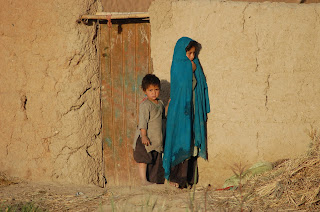March 24, 2011
“YOU could well be the jam in the sandwich,” quipped an
officer as we prepared for our first operation in Helmand’s Nad-e-Ali district.
In theory the set up was simple: around three formations
from B Coy, 2nd Battalion The Royal Gurkha Rifles, sweep the rural setting
searching Afghan compounds for weapons, bomb-making equipment and of course
insurgents, joining up eventually at a central location.
As we made our way north, the others would take different
approaches towards us clearing compounds along the way.
But at the same time a separate plan was being launched in
the desert by 45 Commando Royal Marines, and the Brigade Reconnaissance Force.
They were attacking a known Taliban position, which could have seen them pushed
back towards the populated area where we were.
Fortunately for us, we saw no enemy.
Shots were reportedly fired at one of the formations, and
the insurgents quickly dispersed into the wilderness.
This was the 2RGR’s first operation (named rather weirdly 'Op Tara-Gorga-Ti 24' – meaning ‘brave badger’) since taking over the area of
operations in Nad-e-Ali (south) – and they were keen to impose their presence.
 |
| A Gurkha keeps watch over the patrol |
As well as the lack of insurgents, there was also a distinct lack of weapons caches, explosives, or anything else of note.
When the Gurkhas and British servicemen approached the compounds their Afghan occupants understandably looked terrified.
 |
| A terrified Afghan family look on |
This was
especially understandable given the servicemen were accompanied by members of
the Afghan National Army and Afghan Local Police – all carrying weapons.
While some may have seen the eight-hour operation as being
a waste of time – given that nothing was found – it at least showed that the
British forces are continuing their stance.
 |
| On patrol |
It sought to show the enemy that they won’t rest, and that
they are prepared to hunt down and find anything untoward.
Did the farmers hide the weapons or insurgents before we
arrived? Had word got out that we were on our way? Were there really no weapons
at all in a location which – in the not so distant past – had seen fierce fighting?
Who really knows.
The experience of the operation for me though was a real
eye opener.
It’s not every day you set off for a 10km jaunt into the
unknown at 3.30am. Especially from a location as infamous as this patrol base -
the site where a rogue Afghan police officer injured and killed a number of
British servicemen last year.
With the only light being the near-full moon, the
experience was as daunting as it was exhilarating.
Around whatever camp we find ourselves in from day to day
there is a very present air of caution about what is happening right now. In
terms of insurgent activity any serviceman or woman right now will tell you
it’s “quiet”.
History dictates that the Taliban don’t like to fight in
the winter, preferring instead to retreat. It’s strange but true – they don’t
like the cold.
So as we bask in 42 degrees Celsius of heat, where are the
bad guys? Surely after 10 years of fighting the enemy would know that the
opportune moment to strike would be when a new brigade takes over the security
of the region?
But yet still with that now been and gone, the dusty
sleeping giant is seemingly yet to awake. One theory is that with Afghanistan’s
winter being particularly harsh, it has affected the poppy harvesting.
 |
| A dried poppy |
 |
| Evidence of opium being taken from the poppy |
Certainly as we have patrolled around with the servicemen
and women we have seen countless colourful poppy fields yet to be touched.
Many here think that this is the case, and that when the harvesting is complete in a matter of weeks, that is when the fighting will begin.
Many here think that this is the case, and that when the harvesting is complete in a matter of weeks, that is when the fighting will begin.
Of course the flip side is that maybe we are actually
winning the war and the insurgents are facing defeat. It’s been quiet before
around this time, but the feeling is that this time it’s almost too quiet.
Again, only time will tell.
Twitter: @tristan_nichols
Twitter: @tristan_nichols






No comments:
Post a Comment